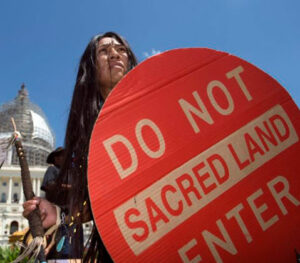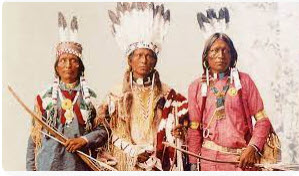Resolution Copper Helping to Save the Planet

VIA ANITA SNOW and MATTHEW DALY Associated Press| March 1st 2024
EDITORS NOTE: The Environmental Left is conflicted daily. One side implores us that unless we cut carbon emission the oceans will rise 2 inches (or more!) in 100 years via polar ice caps melting, that heat waves will be longer and more severe and (seriously) longer growing seasons will happen in North America. Yet, even the most dire predictions are not that significant to human life or anything else.
At the very same time, electrification of the energy system, which is a priority to fend off this “apocalypse” these same environmental activists are joining Native American groups to STOP copper mining which is concomitant to an electric future. The Native leaders claim that Oak Flat is a sacred space to their religious practice, best described as animism. Pinal County citizens would benefit greatly by opening the copper mine at Superior, know as Resolution Copper. The Trump administration gave it a green light at the end of 2020, but the Biden people reversed that decision. The courts are now resolving the issue.
——————————ASSOCIATED PRESS STORY———————————–
PHOENIX — An Apache group that has fought to protect land it considers sacred from a copper mining project in central Arizona suffered a significant blow Friday when a divided federal court panel voted 6-5 to uphold a lower court’s denial of a preliminary injunction to halt the transfer of land for the project.
The Apache Stronghold organization had hoped to halt the mining project by preventing the U.S. government from transferring the land called Oak Flat, located in northern Pinal County, to Resolution Copper.
Wendsler Nosie, who has led Apache Stronghold’s fight, vowed to appeal to the U.S. Supreme Court the decision by the rare 11-member “en banc” panel of the Ninth Circuit Court of Appeals.
Apache Stronghold represents the interests of certain members of the San Carlos Apache Tribe. The Western Apaches consider Oak Flat, which is dotted with ancient oak groves and traditional plants, essential to their religion.
Oak Flat also sits atop the world’s third-largest deposit of copper ore.
An environmental impact survey for the project was pulled back while the U.S. Department of Agriculture consulted for months with Native American tribes and others about their concerns.
Apache Stronghold had sued the government to stop the land transfer, saying it would violate its members’ rights under the free exercise clause of the First Amendment, the Religious Freedom Restoration Act and an 1852 treaty between the United States and the Apaches.
The majority opinion of the appeals panel said that “Apache Stronghold was unlikely to succeed on the merits on any of its three claims before the court, and consequently was not entitled” to a preliminary injunction.
Resolution Copper President and General Manager Vicky Peacey welcomed the ruling, saying there was significant local support for the project, which has the potential to supply up to one quarter of U.S. copper demand.
Peacey said the money could bring as much as $1 billion a year to Arizona’s economy and create thousands of local jobs in a traditional mining region.
“As we deliver these benefits to Arizona and the nation, our dialogue with local communities and Tribes will continue to shape the project as we seek to understand and address the concerns that have been raised, building on more than a decade of government consultation and review,” Peacey said.
U.S. Raúl M. Grijalva, an Arizona Democrat, called the court’s decision “wrong.”
“Tribal communities deserve the same religious freedom protections for their sacred sites that are respected for every other American,” Grijalva said. “The court acknowledges that foreign-owned Resolution Copper will completely and irreversibly desecrate Oak Flat, but they’re giving them the green light anyways.”
“It’s a slap in the face to tribal sovereignty and the many tribes, including the San Carlos Apache, who have been fighting to protect a site they have visited and prayed at since time immemorial,” he added.

















The article says the San Carlos Apache have been fighting to project a site. How long have they been fighting to protect it? Did they make an effort 50 or 60 years ago? Or, is it only because it might become a mine that they are fighting to protect it? If I understand, the land is state trust land. They could have purchased it decades ago if it is so sacred. Have they tried to do that and the state denied them?